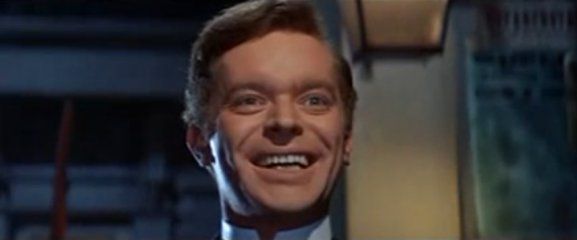All of my experiments are directed towards the freeing of the creature imprisoned within.

For 1960's The Two Faces of Dr. Jekyll, its first stab at Robert Louis Stevenson's classic tale of man's dual nature and how it's a bad idea to encourage his baser instincts, Hammer Films turned to its most reliable director, Terence Fisher, and screenwriter Wolf Mankowitz, who added a twist to the story by making their Dr. Jekyll rather homely and his wicked alter ego Mr. Hyde the debonair gentleman. An intriguing concept, but it doesn't quite take due to how obvious the makeup job is on star Paul Massie, as well as the unnaturally deep voice he adopts to differentiate Jekyll from the suave, soft-spoken Hyde. (One has to wonder how Oliver Reed, who appears unbilled as a young tough who get roughed up by Hyde, would have handled the role.) Introduced espousing his unconventional views to a skeptical colleague (David Kossoff), Massie's Jekyll is presented as something of a prig, condescending to his wife Kitty (Dawn Addams) and completely oblivious to the torrid affair she's carrying on with his best friend Paul (Christopher Lee, in fine form).
When he loses the fake-looking facial hair and putty, Massie's Hyde is unrecognizable, which is why he's able to pal around with Paul, who takes him on a tour of London's lowlights (including an opium den), and openly flirt with Kitty without arousing suspicion. Hyde also takes up with an exotic dancer (Norma Marla) and grows more dominant as time goes on, emerging even after a regretful Jekyll has destroyed his formula. (In his own way, he's the proverbial toothpaste you can't get back into the tube.) Then, believing he's taken over completely, Hyde goes to great lengths to pin his crimes on Jekyll, leading to an inquest where his exploits are summed up in standard mad-scientist speak. ("The case of Dr. Jekyll is a solemn warning to us not to meddle in the divine pattern of nature.") The good doctor turns the tables on Hyde one last time, though, just in time to take his medicine.